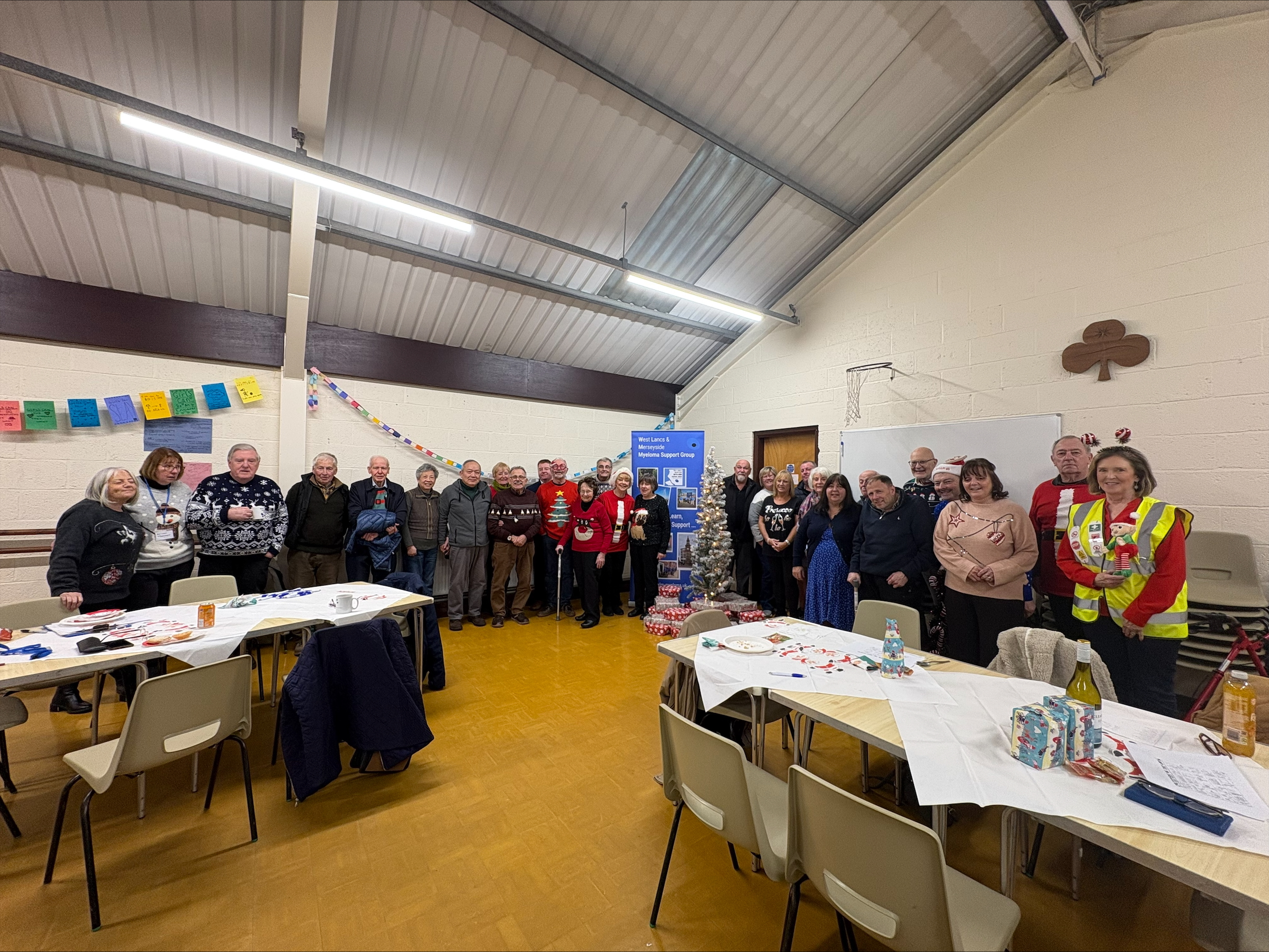
Support from family, friends and fellow patients, along with a positive attitude, are so important when it comes to dealing with a diagnosis of Myeloma.
That is the view of members of the West Lancs and Merseyside Myeloma Support Group which has been helping patients and their families cope with the disease since its formation in 2016 and is helping to highlight symptoms and treatments during Myeloma Awareness Month this March. (2025).
Among the group’s members is Elaine Kinsella, 60, who became concerned about a persistent shoulder pain at the end of 2020, during the Covid pandemic. She was diagnosed with the incurable, but treatable blood cancer in January of the following year.
She said of the Support Group: “I’m not someone who goes every single month but I go when I can. We have guest speakers, including consultants, who can deal with issues around the disease – but I think there is also huge value in talking to other people who are going through the same thing as you.”
Retired police inspector David Wilson, 70, agrees. “The first time I went to the group I found there were some members who had been diagnosed 14 or 16 years ago,” he said. “You can imagine that was a great relief to me – to know that this was not a group you joined and then only survived for six months with the disease!”
That point is well made by the group’s Deputy Leader, Dave Lovelady. He is a founder member and was diagnosed with Myeloma 25 years ago. “The fact that I am still here after 25 years does give people hope,” he said.
There is no pressure to attend every meeting. School teacher Mark Scott, 51, head of humanities at a large secondary, said he can usually only manage to attend during school holidays.
But he said sharing information about the condition was a great help. So much so that Mark also undertakes public speaking engagements for family doctors, helping them to understand the symptoms of Myeloma so they can make an early diagnosis to improve the chances of successful treatment.
Mark was just 45 when he suffered serious lower back pain that left him hardly able to get out of bed for more than eight weeks. Despite his symptoms it took more than 200 days from the first visit he made to his GP to get a diagnosis of Myeloma and begin treatment.
The delay cost Mark, who was over 6ft tall, around six inches off his height because of the impact of the disease on the vertebrae in his lower back. It also left him with kidney damage. But he said he accepts Myeloma is difficult to diagnose and does not blame GPs for not always considering the disease when patients report with symptoms.
“The main symptoms are lower back pain and tiredness – which covers a lot of other conditions,” he said. “The average GP might only see a couple of cases of Myeloma in their career, so spotting the disease is not easy.”
Mark’s Myeloma may have initially been missed because at 45 he was around 25 years younger than the average patient diagnosed with the disease. A keen runner he went to his doctor because of severe back pain that would not go away.
He went through a number of tests and investigations before finally a full blood test was ordered. That discovered he had the condition and he immediately began chemotherapy followed, some months later, by a stem cell transplant. Now 51 he is on maintenance treatment and a monthly blood test to keep him disease free and is fit and back at work.
Mark said: “A positive mindset is so important when you have this disease. There’s no point in saying ‘oh woe is me’. You have to stay as healthy as you can and enjoy life. You can’t do anything about getting the disease, you have to play the hand you’re dealt.”
David Wilson, who spent 34 years in the police, most of them as a traffic officer, praised the treatment he received at Queenscourt Hospice, Southport, which provides specialist pain management. “I discovered hospices are not just for the dying,” he said. “They have controlled my pain – I cannot speak highly enough of the work they do.”
David continues to undergo treatment for his Myeloma and said he had yet to stabilise the condition, but he was hopeful. His big disappointment is that his damaged vertebrae, as a result of the disease, means he cannot ride his beloved Ducati motorcycle.
Elaine’s diagnosis of Myeloma – and the excellent treatment and support she has received – has spurred her to amazing fundraising efforts on behalf of LMRUK. She and her husband Peter have twice been named our charity’s fundraisers of the year.
The couple, who runs two restaurants in Liverpool, started off by asking customers if they would add a small amount to their bill in aid of the charity and, to date, Elaine believes, through support from customers and efforts of the family, they have raised more than £150,000.
She said one of the advantages of belonging to a support group was being able to share information about symptoms and side effects from treatment – and how to deal with them.
“We’re quite a big group and over the four years or so I have been going it has grown. We also have a WhatsApp group, which is really useful for sharing advice and keeping people positive – that is so important,” Elaine said.
To find out more about support available for blood cancer sufferers in West Lancs and Merseyside go to wlm-myeloma.uk









